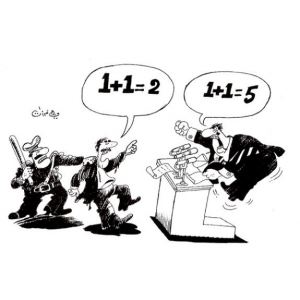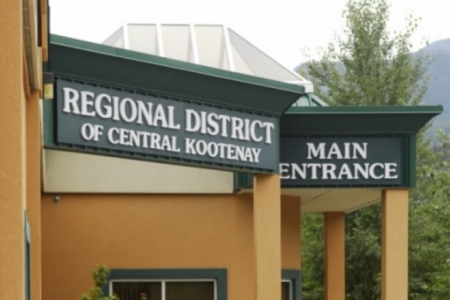QUNFUZ: Some shock, no awe
picture by Ali Farzat
By last Friday, if it hadn’t already done so, the Syrian regime effectively declared war on its own people, killing at least a hundred protestors. Throughout this week parts of Syria have fallen under outright siege.
The tanks and infantry which haven’t peeped across the occupied Golan since 1973 entered the southern city of Dara’a, cutting roads, telephone and internet, water and electricity. Reports from the city speak of food shortages, generalised terror, and corpses stinking in the streets. Snipers are firing at pedestrians in the Damascus suburb of Douma. Tanks surround the coastal city of Banyas. Madaya, a mountain town on the Lebanese border, is also occupied.
The regime may wish to stop weapons being smuggled across the border, or it may wish to stop Syrians fleeing via the smuggling routes. Thousands have crossed to Lebanon in recent days, and at least five hundred have been rounded into the regime’s torture chambers.
The violence has been massive, but also tactically applied. The sudden escalation is intended to shock the population into obedience. Yet live ammunition has not been used everywhere. Security forces have tried not to kill protesting Kurds in the north east, fearing that would trigger a genuine armed insurrection. Demonstrations in central Damascus have been dispersed with batons and tear gas rather than live fire. The regime doesn’t want to kill the sons of important businessmen, not yet at least.
Alongside the violence, the silly stories. Outside powers (neocon-favoured expat Syrians, Abdulhaleem Khaddam, Saudi Arabia) certainly are seeking advantage from the chaos, and in some cases may have infiltrated weapons. But the notion that the country faces armed insurrection, that the army entered Dara’a to rid the city of Salafi gangs, is as absurd as the supposed discovery of a consignment of pills from al-Jazeera, with the Jazeera logo printed on each bag. (Is this a spoof? Are they really so stupid?).
The people on the streets are calling for freedom and national unity, not for a Sunni chauvinist state. But just as the Bahraini regime painted the uprising there as a Shia plot, regime supporters in Syria are currently exploiting some very unpleasant, very orientalist, very arrogant and ignorant prejudices about Sunnis. They point to films of people shouting Allahu Akbar, or of badtempered Wahhabi clerics cursing the regime, to ‘prove’ that the uprising is Salafist and inherently threatening to minorities. Their theory does not account for the Alawi intellectuals supporting the uprising, or the Christian protestors shot dead in Homs, or the protests in the Ismaili city of Selemiyeh.
In Sunni areas, a call for ‘jihad’ under fire does NOT mean a call to kill minorities or for Salafi rule. And say some of the protestors actually are Salafis. Does a man with a beard not have the same right to dignity as a cleanshaven man?
It would be stupid to deny the potential for sectarian strife. If blood continues to spill, the possibility of armed resistance grows. An armed fight could give birth to regional and sectarian militias. Western military intervention would most likely spin the situation in Iraq’s direction. The likelihood that escalating conflict will end in a power vacuum means that Saudi and American money could have a foundational, and very negative, influence on Syrian politics afterwards.
For all these reasons, if the regime truly cares for Syria, it would be best advised to cease repression immediately and announce an orderly transition of power. The regime would be encouraged to do so if more soldiers were to take the noble step of those in Dara’a who stood with the people, if more Ba’athists followed the example of those who resigned from the party. Perhaps there are generals or powerful people in the Alawi community who have clear sight. We are not yet anywhere near a sectarian war. Current events could still have a positive outcome.
A return to the status quo ante is out of the question. This week’s shock and awe clearly hasn’t worked. Cities refusing to be cowed today include Banyas, Homs, Deir ez-Zor, Qamishleh, Amouda, Hama, Idlib and Ma’arat an-Numan. There were protests in the Damascene suburbs of Kisweh, Tell and Harasta, and after several thousand marched from Meydan there is no doubt the uprising has reached the centre of the capital.
The crisis was coming anyway, but regime miscalculations greatly hastened it. If Bashaar had shown the political adaptability his father applied in geo-strategy, and if he were the pan-Arabist he claims to be, he might have realised when the revolution reached Egypt that the Arabs had begun an inevitable process of change. He might have exploited his undoubted popularity to facilitate the change, and he might have entered history as a great Syrian statesman. Instead he told an interviewer that Syrians would be ready for freedom in another generation, and gave a silly giggling performance before the ridiculous parliament, and pretended to reform even as his thugs cut down the innocent. By arresting schoolchildren, the regime caused protests in Dara’a. By killing protestors, the regime caused protests all over the country. Those who called for reform now call for the fall of the regime.
Some people are still wrapped up in the Asad family soap opera. Is Bashaar a nice bloke really, but weak, scared of his tough brother Maher? Is Bashaar’s nasty uncle Rifa’at behind the militias terrorising the coast? But more and more people have tired of the drama. They are losing their ability to suspend disbelief. It no longer concerns them which member of the gang may be nicer than the others. It’s still the same gang, one whose only response to peaceful dissent is to lie and murder. All this blood has washed away illusions. The pretence of a regime desirous or capable of reform has been effaced, and the raw mechanics of power are revealed in their brutal nakedness.
Robin Yassin-Kassab is a UK-based writer, activist and journalist. This column originally appeared in his blog.

























Comments